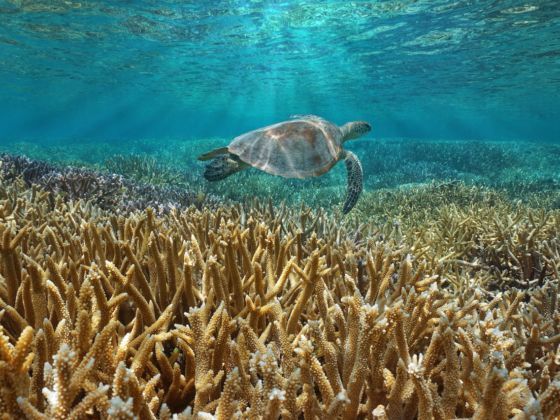I’M FROM TORONTO, but for two years I lived on an island in the Caribbean. There, the locals say that from any point on the island you’re never more than 14km away from the sea. The ocean, of course, becomes a big part of the lifestyle; people make their living from fishing, while surfing, diving, and family outings to the beach are commonplace activities.
One of my fondest memories of Martinique is from last year, when I had the opportunity to witness migrating humpback whales and wild spotted dolphins in the open water. I was so excited — I squealed, I pointed, I photographed; I’d never seen anything like it.
Today, I live on another, not-so-Caribbean island: Great Britain. I’m nowhere near open water, but I still feel a connection to the sea. My Martinique experience brought home exactly how precious our oceans are — and how much there is to protect. I care deeply about ocean conservation; here are six reasons you should too.
1. Oceans are the largest ecosystem on Earth and harbor tremendous biodiversity.
Earth’s oceans make up over 90% of the habitable space on the planet, and researchers believe that 50-80% of all life is found underwater — and we’ve barely seen any of it. According to the National Oceanic and Atmospheric Administration, only 5% of the ocean has been explored, potentially leaving thousands, if not millions, of species undiscovered.
Read more about marine conservation
Protecting the ocean means protecting all of the Earth’s ecosystems. Beaches, lakes, rainforests, swamps — all rely directly on the health of the ocean. Without it, they will surely suffer too.
2. Oceans are the lifeblood of Earth — if they go, we go with them.
The ocean regulates temperature, generates half the oxygen we breathe, absorbs carbon dioxide (which reduces the effects of climate change), influences the weather, and essentially supports all living organisms on Earth. It’s often the means by which our food and shelter are transported from one place to another. Even more basic than transporting our food, the ocean supplies us with food — one-sixth of the protein we eat, in fact.
3. The ocean is home to some of our oldest and most unique species.
The first species of shark appeared over 420 million years ago, and sea turtles practically live forever (by human standards, anyway). But ocean species also happen to be the most vulnerable. For example, according to the World Wildlife Fund, there are only around 300 North Atlantic right whales left in the world, and threats like coral destruction, ocean acidification, and invasive species are only exacerbating the problems faced by marine life.
4. Future generations of travelers will only read about the marine habitats and beaches we enjoy.
Take good photos, because the next generation will probably need them for textbooks. For example, scientists predict that without drastic change, the long-term survival prospects of most of our remaining coral reefs look bleak.
Sure, travelers of the future may be able to see wildlife in zoos or aquariums — but it’s just not the same. It’s like claiming that eating at a Moroccan restaurant in London is the same as exploring the souks of Marrakech.
I want my descendants to be able to benefit from the same kind of life-altering marine wildlife experiences that I had in Martinique.
5. Coral reef destruction will eventually mean no more diving / snorkeling.
Let’s get selfish for a second: I’ve never seen the Great Barrier Reef, but I would really like to one day, and surely there are plenty of people in the same boat. Diving tourism is extremely popular, and it implies that people truly do value the ocean and marine life, even if only for the reason of enjoying it on a dive trip.
Yet, there are a number of significant threats to coral reefs. One-quarter of the world’s reefs have already been destroyed due to pollution and climate change, as even marginal increases in ocean temperature throw off the delicate balances that keep reefs thriving. At the same time, part of this destruction is caused by travelers themselves — taking pieces of coral as a souvenir, more or less ‘invading’ these places rather than respectfully visiting them. But all people need is a little awareness, which brings me to my next point…
6. You should be concerned about ocean conservation because you can make a difference.
Make informed decisions about which tour companies you use, avoid purchasing souvenirs that exploit marine wildlife, take care of the beach you surf or tan on. Stop using as many plastic products, and only purchase seafood that is certified as sustainable. Educate yourself, because learning about ocean conservation will help you make choices that protect our planet’s most important resource.

